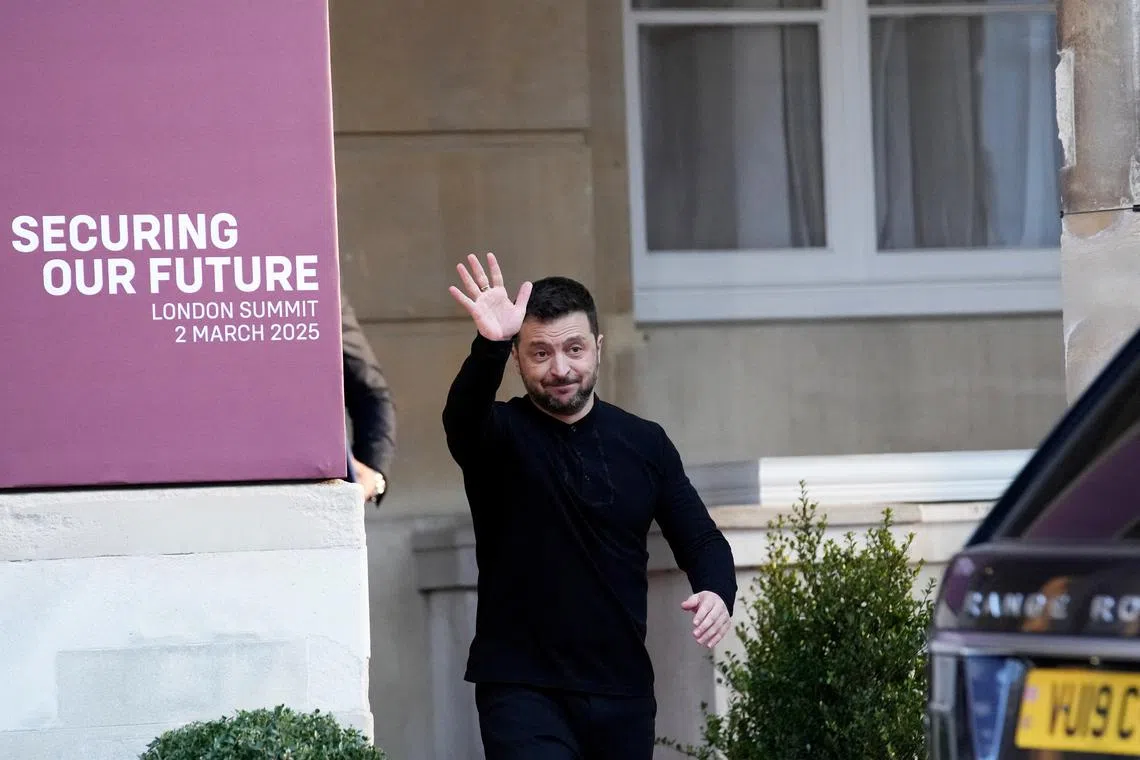Did Ukraine have to become a partisan US issue?
Sign up now: Get ST's newsletters delivered to your inbox

One expert said there was still strong bipartisan support for Ukraine but that Ukrainian President Volodymyr Zelensky had ignored advice.
PHOTO: REUTERS
Follow topic:
WASHINGTON – Could support for Ukraine have survived the bitter and increasingly polarised politics of Washington?
When Ukrainian President Volodymyr Zelensky made Washington his first foreign destination after Russia invaded his country, leaders of both major US parties escorted him to address Congress, where in his military fatigues he made the case for help.
Some Republicans stayed away during the holiday-season visit in 2022 but even many critics of aid came and listened. Then US President Joe Biden affectionately put his arm around Mr Zelensky at the White House and his administration announced nearly US$2 billion (S$2.66 billion) in additional weapons.
Such scenes, and the bipartisan veneer around them, are long gone.
When Mr Zelensky visited President Donald Trump on Feb 28, an Oval Office meeting descended into an unprecedented on-camera feud,
Even some Republicans supportive of Ukraine said Mr Zelensky misread the politics, as he talked back to Mr Vance by questioning the credibility of any promises by Russia.
Senator Lindsey Graham, a Republican ally of Mr Trump, said he met Mr Zelensky ahead of the White House meeting and told him: “Don’t take the bait.”
After the White House meeting, Mr Graham went so far as to say that Mr Zelensky should quit. But Mr Zelensky has since worked to repair the rift, writing a letter to Mr Trump and agreeing to talks with US officials in Saudi Arabia.
“It wasn’t at all inevitable that Ukraine would become a divisive political issue,” said American University Associate Professor Jordan Tama, who has researched the effects of US polarisation on foreign policy.
The professor added that the turning point came when Mr Trump and media pundits who share his “America First” worldview, notably Tucker Carlson, began to criticise aid to Ukraine.
Mr Trump “has politicised Ukraine policy, moving it from an issue where there was bipartisanship to one where there’s more polarisation”, he said.
Mr Vance once said that he does not care what happens to Ukraine, as China is the larger priority.
The President’s son Donald Trump Jr has taunted Mr Zelensky on social media, recently sharing a deepfake video of an effete dancer with the Ukrainian leader’s likeness.
The professor said Mr Trump pulled away Republicans who otherwise would have supported Ukraine, even though many in the party still do.
“Mr Trump has generated more partisan division than there would otherwise have been. But the issue is not yet entirely split along partisan lines,” the professor added.
Immediately after Russia’s invasion, nearly 80 per cent of Americans backed aid to Ukraine, according to the Chicago Council on Global Affairs.
A recent CBS News/YouGov poll, however, found the public almost evenly divided on whether to send more assistance to Ukraine, with far more Democratic voters supporting aid.
Ms Leslie Shedd, until recently a top advisor to the Republican chairman of the House Foreign Affairs Committee, said there was still strong bipartisan support for Ukraine but that Mr Zelensky had ignored advice.
“Many Republicans have used their own political capital to help Ukraine and are rightfully frustrated that President Zelensky seemed unwilling to help himself in that meeting,” said Ms Shedd, now a fellow at the Atlantic Council.
She blamed Mr Biden for not sending more decisive weapons earlier that could have benefited Ukraine.
It became more politically difficult to support aid when seeing a slow war of attrition, especially when voters are concerned about other issues such as inflation and illegal immigration, she said.
“Republican voters in particular have had long grievances with the US government spending billions of dollars overseas while not addressing the problems they face at home,” she added.
Polls also show fewer US voters perceive a threat from Russia three years into the war.
Polling shows a mirror image of the Ukraine debate on the Middle East, with Republican voters overwhelmingly backing billions of dollars in weapons to Israel and Democrats more critical due to concerns over the rights of the Palestinians.
Foreign policy drew far more consensus in Washington during the Cold War, with both parties united in their opposition to the Soviet Union.
The professor said polarisation was aggravated by the consolidation of the two parties along ideological lines and by media fragmentation that has often left voters consuming slanted news or social media.
“More foreign policy issues are polarised along partisan lines than used to be the case,” he added.
“It’s hurting America’s reputation because it makes America look inconsistent and unreliable to our partners overseas.” AFP

